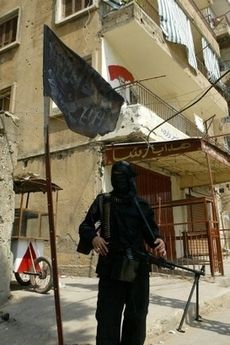 by Omar Ibrahim, TRIPOLI, Lebanon (AFP) - Four people were killed and at least 33 others wounded in north Lebanon on Sunday in clashes between armed opponents and supporters of the parliamentary majority, security officials said. After a lull of several hours, the two sides traded fire with Kalashnikov assault rifles and rockets in the Bab al-Tebbaneh and Jabal Mohsen districts of Tripoli, said an AFP correspondent in the port city. A security official said Hassan Khalil and Ibrahim Sleiman Ibrahim were killed in Jabal Mohsen, adding to the casualty toll of two dead and 33 wounded in earlier clashes. Also among the dead, policeman Samer Rashid was hit by a stray bullet inside his home in the Al-Qobbe district of Tripoli, security officials said. Another man, Bourhane al-Khatib, died after being hit by a bullet in the heart during clashes at Jabal Mohsen, said a medic after the 22-year-old was taken to a hospital in the nearby Palestinian refugee camp of Beddawi.
by Omar Ibrahim, TRIPOLI, Lebanon (AFP) - Four people were killed and at least 33 others wounded in north Lebanon on Sunday in clashes between armed opponents and supporters of the parliamentary majority, security officials said. After a lull of several hours, the two sides traded fire with Kalashnikov assault rifles and rockets in the Bab al-Tebbaneh and Jabal Mohsen districts of Tripoli, said an AFP correspondent in the port city. A security official said Hassan Khalil and Ibrahim Sleiman Ibrahim were killed in Jabal Mohsen, adding to the casualty toll of two dead and 33 wounded in earlier clashes. Also among the dead, policeman Samer Rashid was hit by a stray bullet inside his home in the Al-Qobbe district of Tripoli, security officials said. Another man, Bourhane al-Khatib, died after being hit by a bullet in the heart during clashes at Jabal Mohsen, said a medic after the 22-year-old was taken to a hospital in the nearby Palestinian refugee camp of Beddawi.According to security officials, many of those wounded were caught in the crossfire and hit by stray bullets while inside their homes. Calm had been restored in the afternoon as representatives of the feuding parties met in Tripoli and agreed on the Lebanese army taking charge of security and for gunmen to keep off the streets, said a participant. Before the fighting resumed, Education Minister Khaled Kabbani said end-of-year exams would take place as scheduled in Tripoli's schools on Monday. The fighting initially broke out at 4:15 am (0115 GMT) in Bab al-Tabbaneh and Jabal Mohsen, both northern districts of Tripoli, a security official told AFP. He said pro-majority Sunni militants fought with a group of Alawites, a dissident branch of Shiism which however supports the Shiite opposition movement Hezbollah. The fighting spread to Al-Qobbe in eastern Tripoli.
Bab al-Tebbaneh and Al-Qobbe are mainly Sunni districts while residents of Jabal Mohsen are predominantly Alawite.
Similar clashes occurred in various regions in May when 65 people were killed, stoking fears that Lebanon, which endured 15 years of civil war up to 1990, was heading for a new conflict.
An accord reached in the Qatari capital, Doha, on May 21 between the opposition and government ended an 18-month-long political crisis which sparked the clashes.
The agreement resulted in the election of Michel Sleiman as president, ending a six-month vacuum in the top job.
But tensions have remained high and last Tuesday three people were killed in clashes between pro- and anti-government residents in two villages in the Bekaa area of eastern Lebanon.
Sunday's clashes occurred amid continuing failure to form a national unity government as envisaged under the Doha agreement.